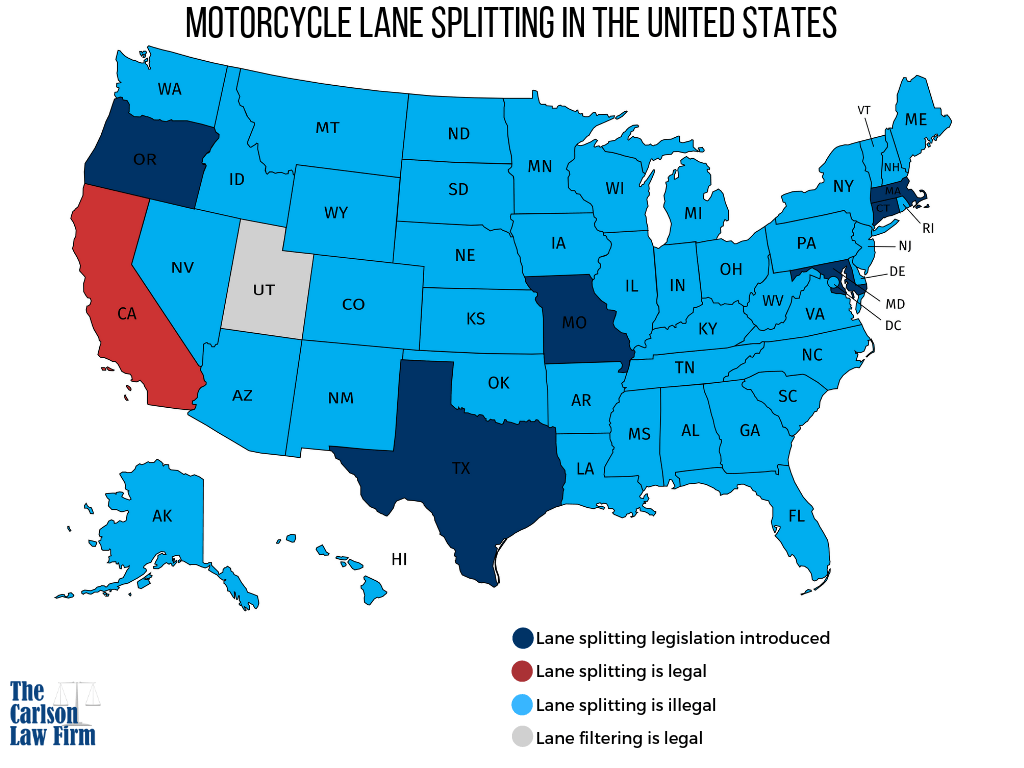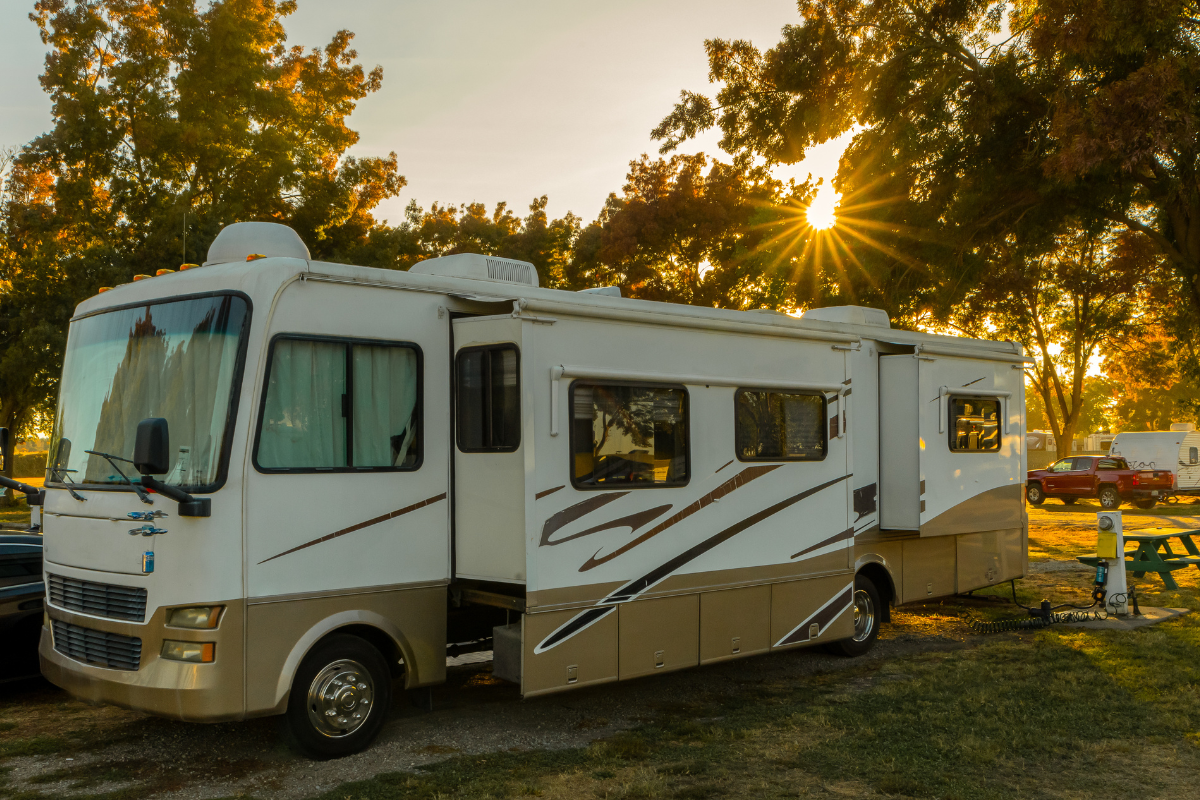Your morning commute is taking longer than usual. You’ve finished your first cup of joe while waiting in bumper to bumper traffic, but your highway exit is finally within sight. You put your blinker on to switch lanes, but suddenly a motorcycle zips past you. Good thing you checked your side mirrors. Twice.
This exact scenario may soon be the reality for many Americans as legislatures across the nation begin debating the controversial topic of lane splitting. Even the National Highway Transportation Safety Administration (NHTSA) is suggesting more research be done to examine the pros and cons of lane splitting.
The stop-and-go of rush hour traffic may be slow and frustrating; however, slowed traffic requires careful attention. It is essential to watch for vehicles shifting lanes, abrupt stops, and, as more states adopt the law, the occasional motorcyclist lane splitting.
What is lane splitting, and how does it differ from lane filtering?
Lane splitting occurs when a bicyclist or a motorcyclist rides between lines of either stopped or slow-moving vehicles that are traveling in the same direction. Lane-splitting allows for the motorcyclist to move through traffic faster and bypass most traffic.
Whereas lane splitting involves riding between two lanes of traffic, lane filtering involes using the edge, or shoulder, of the roadway going forward in the same direction. Lane splitting and filtering may seem like similar maneuvers but are different in the eyes of the law. There are considerably more states that allow lane filtering.
Is lane splitting legal in Texas?
Lane splitting is illegal in Texas, the only state that allows lane splitting explicitly is California. Traffic laws in Texas require vehicles to remain within a single lane of traffic on roads that are divided into two or more lanes.
This may not be the case for long. In December of 2018, Texas State Senator Kirk Watson introduced SB-273. This bill would allow lane splitting on certain highways in the event of heavy traffic. Lane splitting would only be permitted if:
- The motorcyclist must not exceed 5 miles per hour greater than the other traffic.
- The traffic is moving at a speed of 20 miles per hour or less.
The 86th Legislature adjourned with the bill stuck in committee. However, if reintroduced in the future, SB-273 would allow bikers in Texas to travel in between lanes when traffic conditions allow. Additionally, this bill can significantly help with Texas’s traffic congestion.
Is lane splitting safe?
Lane splitting is a controversial topic amongst bikers and their state lawmakers. Traveling too close to other vehicles is always dangerous and can result in serious and life-threatening injuries.
Motorcyclists are smaller than other vehicles on roadways making their visibility considerably lower than their motor-vehicle counterparts. Motorcycles are automatically at a disadvantage when it comes to visibility; they are smaller than cars but can accelerate or decelerate faster, making it harder for other motorists to judge distance. It is recommended that bikers wear bright colors to increase their visibility.
Rear-end collisions account for 40% of all accidents on U.S. roadways. When vehicles are rear-ended, there is the possibility of minimal damage and minor injuries.
On the other hand, there are no minor fender benders when a motorcycle is involved. Bikers are at a higher risk of being injured in a rear-end incident. Lane splitting allows for bikers to avoid this potential collision. Bikers who lane split are less likely to suffer traumatic brain injuries, torso injuries, and even death. This is because allowing lane splitting protects bikers from potential rear ends from larger vehicles by giving them an escape route. Naturally, there is an inherent risk bikers face when moving in stopped or slowed traffic. Often, drivers may use the time to look at their phones, change the radio station, or other distractions that prevent them from paying attention to what’s up ahead.
How Lane Splitting Can Benefit Everyone on The Roadway
Motorists on the highway often believe that bikers are not waiting “in line” when they lane split in traffic. This is a common misconception. On the contrary, lane splitting is beneficial for motorist in slow-moving traffic. Since the bike has moved out of the way, it allows each vehicle to be one spot closer to their final destination. The biker and the drivers both travel quicker when a biker participates in lane splitting.
For instance, a 2012 Belgian study found that if 10% of drivers switched to motorcycles that travel times would decrease by eight minutes per journey. A shorter commute not only benefits the drivers but the environment as well.
Driver envy
Often, when drivers watch bikers lane split from their stationary vehicles, they become green with envy. Some drivers are not keen on the idea that bikers are moving through traffic while they are at a stand-still.
There have been instances of drivers rage obstructing motorcyclists from traveling next to them. If lane splitting or filtering is allowed in your state, it is illegal to block a biker from legally doing so.
Not only will the driver be at fault if the motorcycle crashes as a result of their predatory driving, but they may also face criminal charges. Driving with the intent to cause harm or the threat of impact is illegal.
Lane splitting legislation across the nation
Lane splitting is a common practice across Europe. The United States seems to be following close behind. Currently, California is the only state the specifically allows this maneuver; however, there are several states considering adopting lane-splitting.
As states push towards the legalization of lane splitting, the public needs to be aware of the maneuvers guidelines.

How to Lane Split Safely
If lane splitting is legal in your state, then it is one of the many benefits of having a motorcycle. While you’re busy helping your cities traffic congestion and cutting harmful vehicle emissions, it is important to remain safe while lane splitting. There are a few helpful tips to keep in mind:
- Avoid lane splitting while next to large vehicles such as semi-trucks and buses.
- Consider your environment. (Road conditions, lane width, weather conditions, etc..)
- Make yourself visible to other drivers, don’t travel in blind spots.
- Help other motorists see you by wearing brightly colored/reflective clothing.
- Riding on the shoulder is not considered lane splitting.
- Follow state lane-splitting speed laws.
The Carlson Law Firm Cares About Public Safety
If you or a loved one have suffered an injury resulting from a motorcycle collision, don’t hesitate to contact The Carlson Law Firm for a free consultation. We have experience advocating on behalf of motorcyclists that have been injured due to someone else’s negligence. Not only will we fight for maximum compensation, but we will use our resources to ensure you are receiving the medical treatment necessary to recover from your injuries.
Contact us today. We care, we can help.





